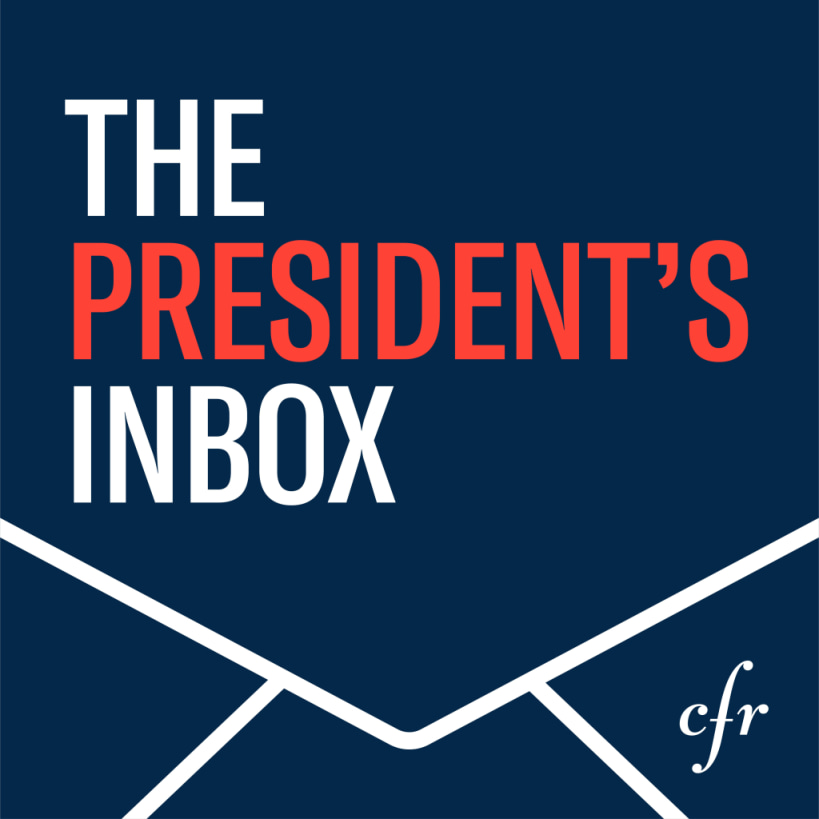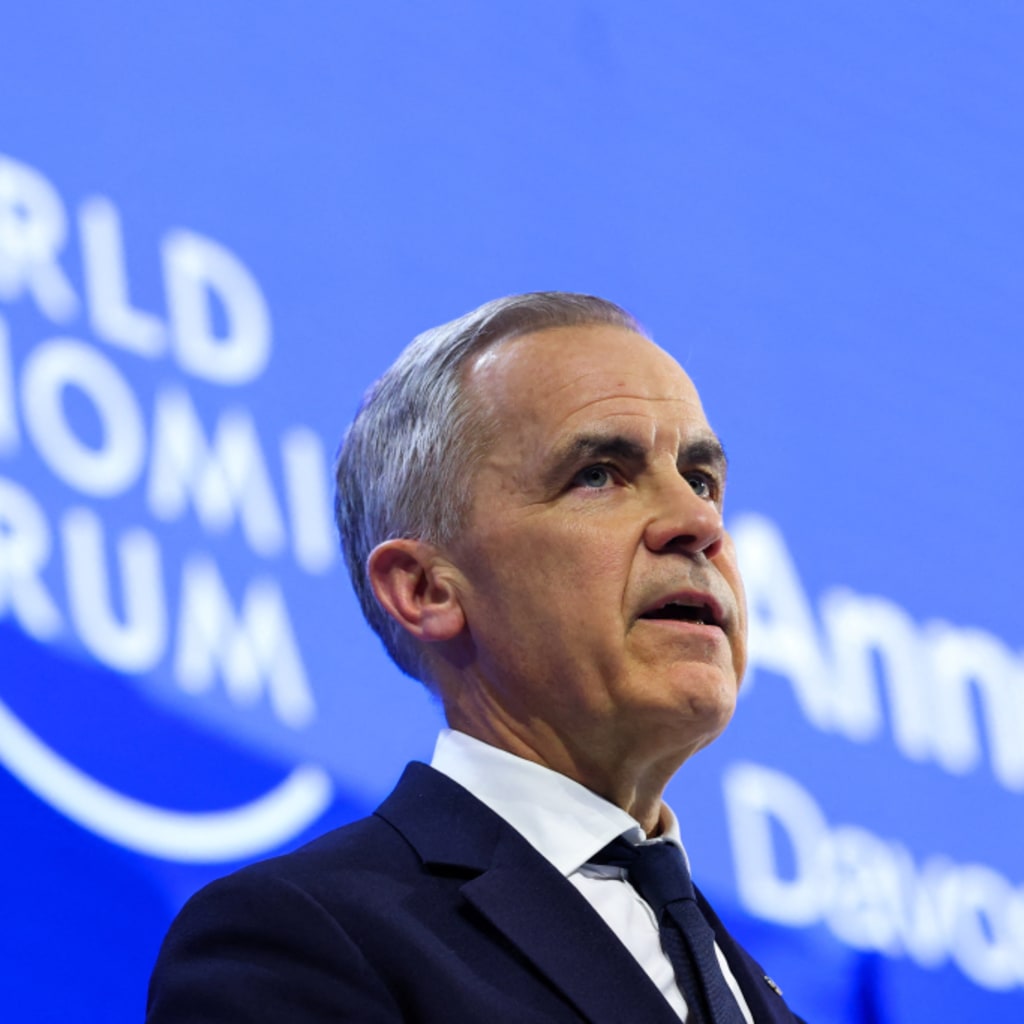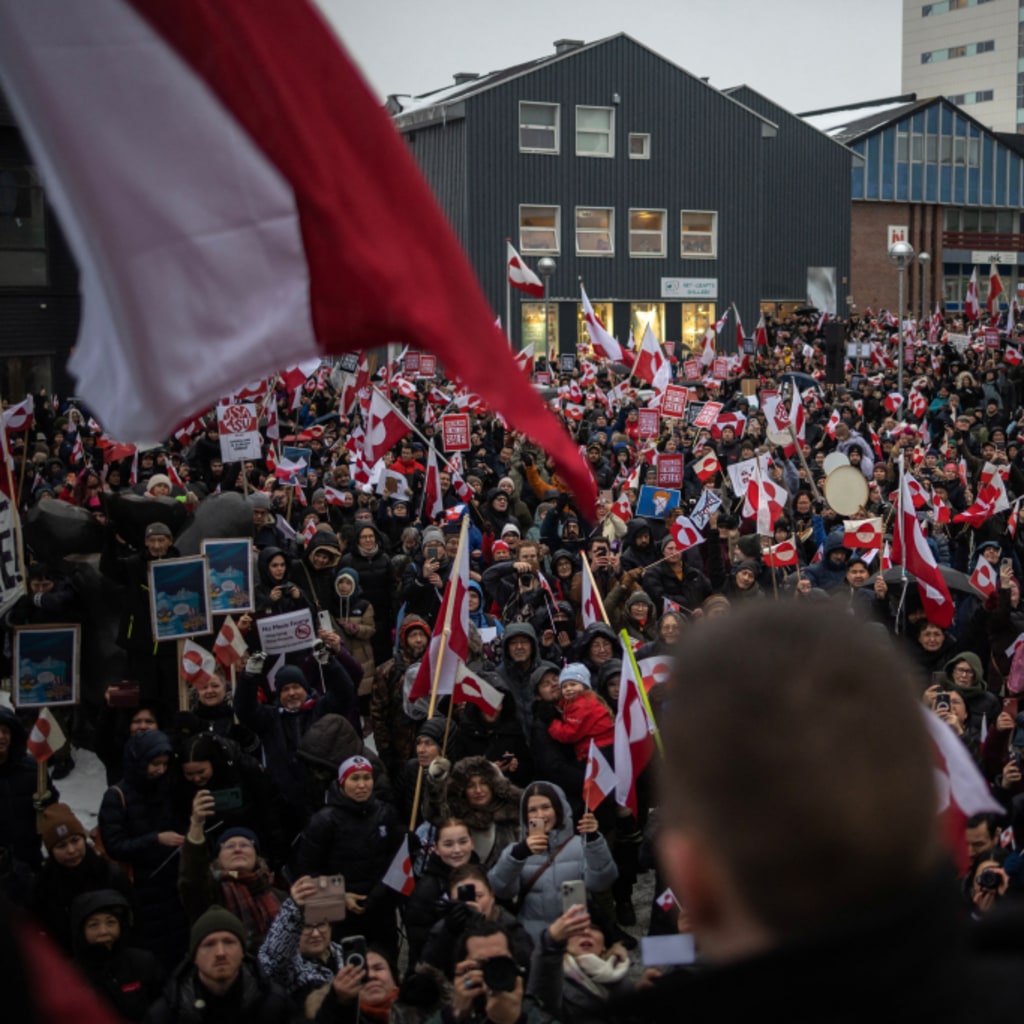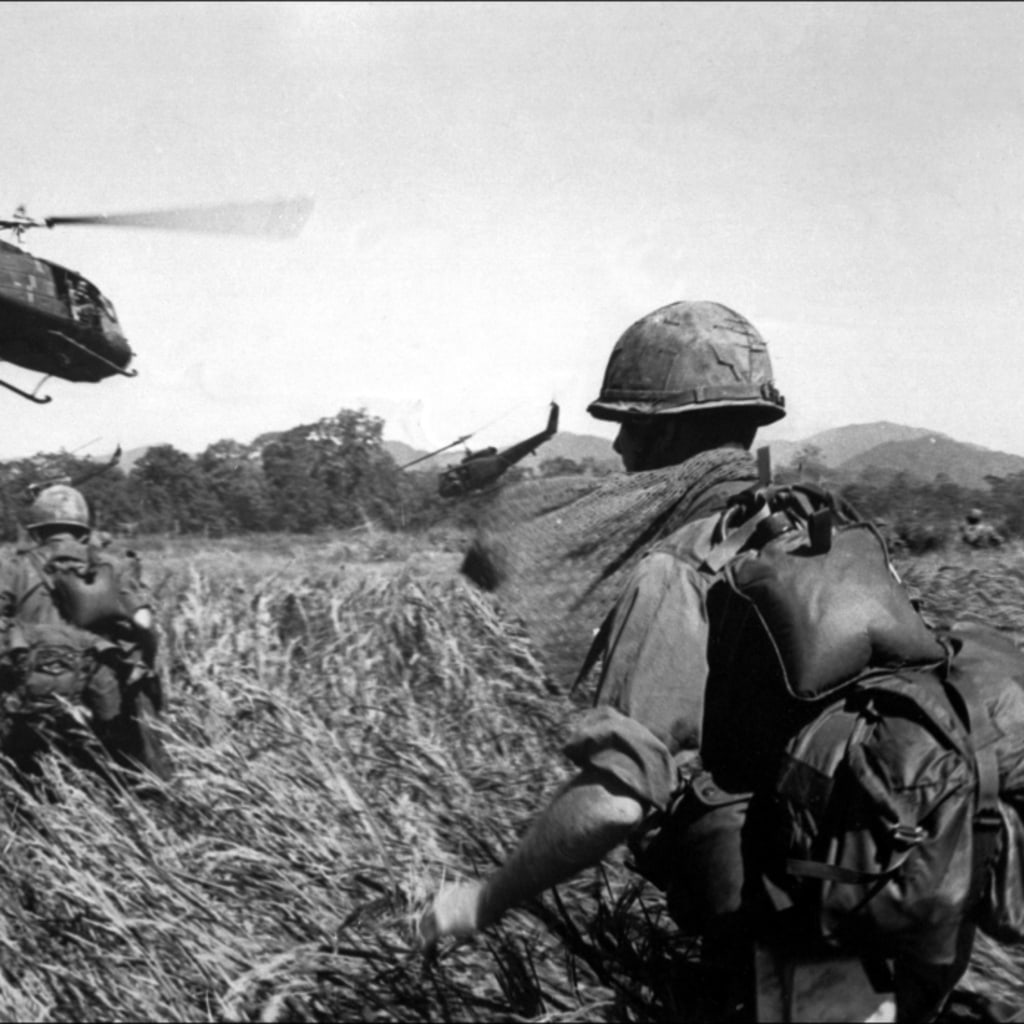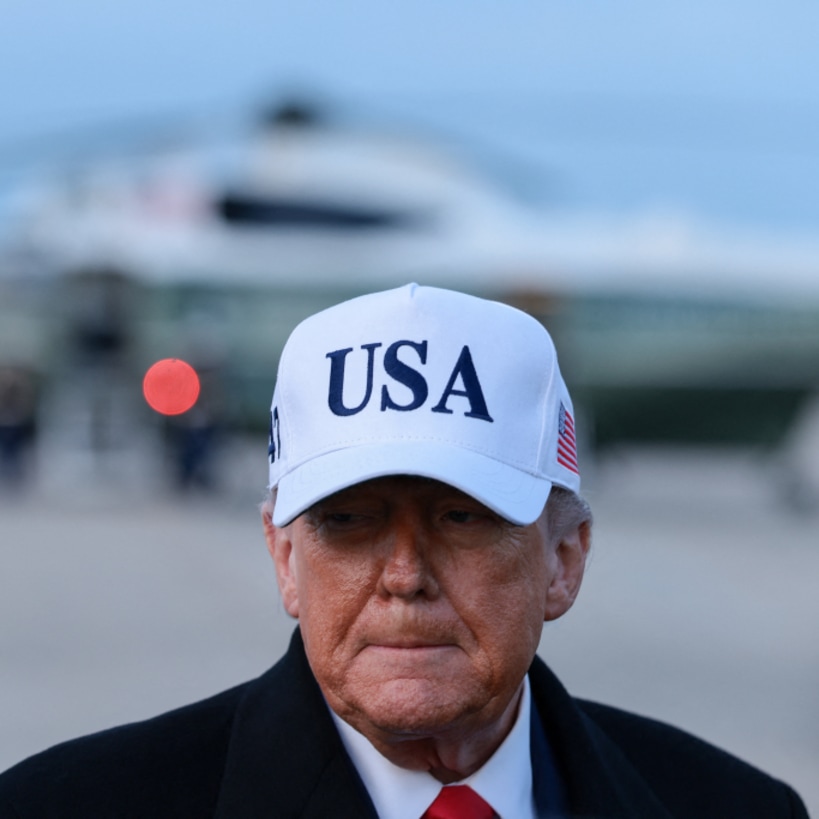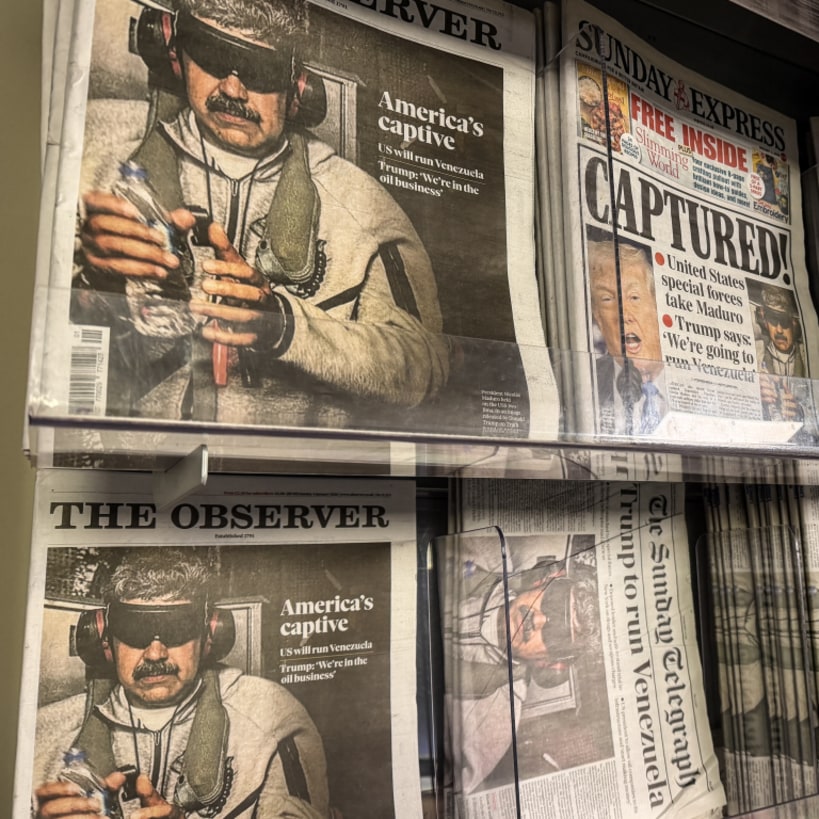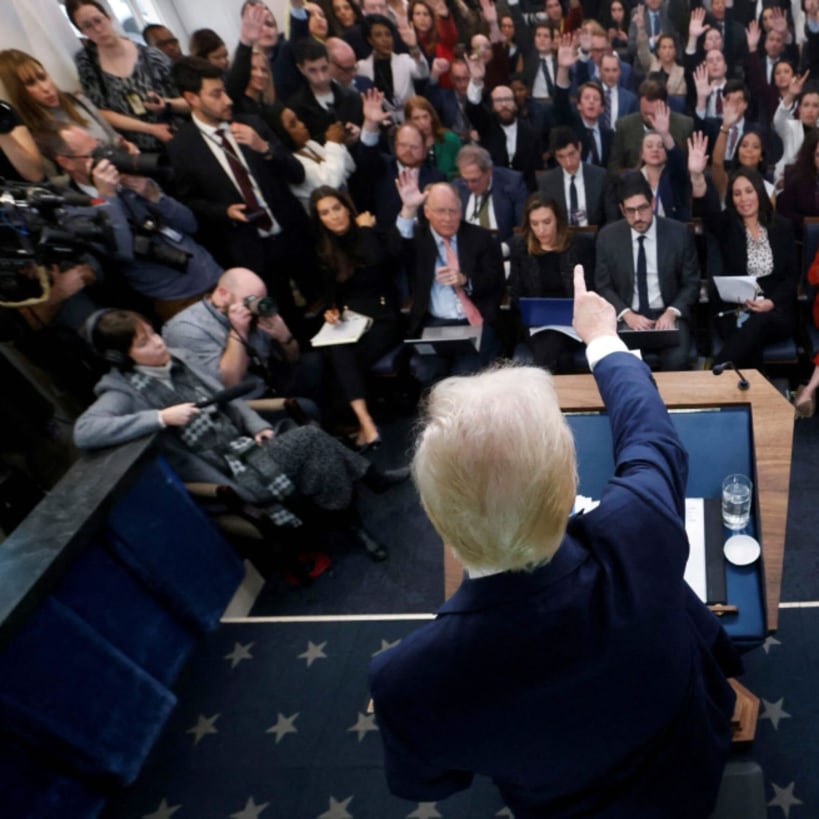Ukraine’s Attack on Kursk, With Liana Fix
Liana Fix, a fellow for Europe at CFR, sits down with James M. Lindsay to discuss Ukraine’s surprise incursion into Russia.
Published
Host
- James M. LindsayMary and David Boies Distinguished Senior Fellow in U.S. Foreign Policy
Guest
- Liana FixSenior Fellow for Europe
Associate Podcast Producer
- Ester FangAssociate Podcast Producer
- Kenadee Mangus
Editorial Director and Producer
- Gabrielle SierraDirector, Podcasting
Show Notes
Mentioned on the Episode
Liana Fix, “NATO and Ukraine: The Peril of Indecision,” Survival
Liana Fix and Michael Kimmage, “The Ukraine Scenarios,” Foreign Affairs
Transcript
LINDSAY:
Welcome to The President’s Inbox, a CFR podcast about the foreign policy challenges facing the United States. I’m Jim Lindsay, director of Studies at the Council on Foreign Relations. This week’s topic is Ukraine’s attack on Kursk.
With me to discuss Ukraine’s surprise incursion into Russia earlier this month is Liana Fix. Liana is a fellow for Europe at the Council. Her research focuses on European security, transatlantic relations, and Russia. Along with Michael Kimmage, she’s the author of the popular Ukraine Scenarios series at Foreign Affairs Magazine. Her most recent piece written for Survival Magazine is “NATO and Ukraine: The Peril of Indecision.” Liana, thank you for coming back on The President’s Inbox.
FIX:
Thanks so much for the invitation, Jim.
LINDSAY:
So let’s do a scene setter here, Liana. Earlier this month, Ukrainian forces attacked Russia in the region known as Kursk, a scene for people who remember their World War II history of the largest land battle in world history and a turning point in the course of the Second World War. The attack seems to have succeeded. Ukrainian forces seemed to hold something in the order of five hundred square miles of Russian territory. Why did Kyiv send Ukrainian troops into Russia for the first time in the war?
FIX:
So there are multiple reasons to that. I mean, first there’s a military reason. Ukraine has been under pressure on the eastern front by Russia and for a long time now, Russia is advancing on Ukraine’s eastern front. It’s sacked. Russia has recently sacked the village of Niu-York in Ukraine. And the idea from a military perspective is to divert Russian forces instead of to bring them back from the eastern Ukrainian front line into Russia. Has that worked? So-and-so. There are some reports that a few thousands of Russian soldiers from eastern Ukraine are being re-diverted to Kursk region. But at the moment, Russia is using mostly conscripts to try to defend that region.
And the Economist, for example, estimates that the fighting in eastern Ukraine really has not died down. So Ukraine has been successful in Kursk, but this has not lowered the pressure on Ukrainian forces in eastern Ukraine yet.
LINDSAY:
And I should just note the Kursk is north of Ukraine.
FIX:
Exactly. So the second reason that Ukraine is doing this is to regain political initiative. It’s a political reason. And there are credible reports that the U.S. administration has not been involved in the planning of this offensive because in the past, Ukrainians have been upset about leaks to the press of anything they were planning militarily. This surprise moment is meant to give Ukraine back the initiative and to demonstrate that Ukraine is still able to win on the battlefield, perhaps not in Ukraine, but in Russia. Also—
LINDSAY:
Is that a signal to the Ukrainian people, to the West, to both?
FIX:
All at the same time, but also a signal towards Russia. Because what Ukraine is doing with that is that it increases its leverage in any potential talks in the future with Russia because now it’s not only negotiating about Ukrainian territory, it’s also negotiating about Russian territory that it holds. And of course, Russia says, all negotiations and talks have died with this incursion, but Ukraine has made the pie bigger for itself, and that is quite a success.
And then there’s also obviously the reason from a Ukrainian perspective to raise the morale of its own people, which has been quite low. There have been opinion polls, especially ahead of this winter, which will be a tough winter for Ukrainians on the energy front that more and more Ukrainians are more open to negotiations and to talks in the future. And again, this plays into a situation where Ukraine has more leverage towards Russia, but also more leverage towards its Western partners to say, “Look, we are successful. And finally we are so successful that perhaps you should drop your ban on using long-range strike weapons into Ukraine,” which is a big thing that Ukraine has been asking for, for a long time from UK, France, and the U.S. And they are all not allowing Ukraine to use these weapons in Russia out of concern of escalation.
And Ukraine is demonstrating, “Your escalation concerns are just not justified. Russia is not responding forcefully to what we are doing now, so drop the final red line that you have on the use of long-range strikes in Russia.”
LINDSAY:
I want to explore that before we do, Liana. Why did it take more than two years for Ukraine to strike in Russia? Why didn’t that happen in the opening months of the war?
FIX:
Yeah, I mean in the opening months of the war for Ukraine, it was sort of fighting back on its own territory. That was very clear. There is a valid question to ask, why did it not happen in the second year of the war where Ukraine was advancing, where it was planning a counteroffensive, which then failed in eastern Ukraine.
At that time, the political framework for Ukraine to act was very much defined by Western partners as you’re supposed to act within Ukraine and only slowly have these red lines been loosened. And only slowly, just recently, the Biden administration has allowed Ukraine to defend itself across the border because Russia was establishing a sanctuary, of course, sort of on its own territory. And now the political momentum for Ukraine was there to not only attack Russia through drones as they’ve done in the past and through minor raids, but to say we feel Western opinion or Western, especially political leaders, are at a point where this will not be a major political blow back for us if we do. And they’ve been right, there’s not been a major political blow back from its supporters.
LINDSAY:
So as we look at it then, what do you make of the fact that Kyiv did not inform the Biden administration of its strike in the Kursk? Is that significant or not?
FIX:
I think it is significant because the Biden administration has tried throughout the war to control Kyiv and what it is doing, especially on the escalation dominance front. And the Biden administration has also pressured Ukraine when it came to the NATO membership question to accept what is being offered. So it very much was focused in the last year on telling Ukraine, “Well, act within the guidelines that we provide you.” And Ukraine has become impatient with that.
And I think it is a signal of impatience that it sees, well, the U.S. is in an election year, the U.S. administration is in a position where it cannot sort of act in the long term as it has done in the past. Why do we not make use of that? And it shows more assertiveness by Kyiv, which can make Western partners nervous, but which also helps Kyiv to finally do what they always wanted to do to bring the war back to Russia, which they are allowed to, internationally and legally that’s absolutely fair, but felt constrained by Western partners for a long time.
LINDSAY:
So where do you think the Biden administration is going to go on this issue of which weapons can be used to what purposes? Because it does seem to me that by going into Kursk and using U.S. munitions, Ukraine has violated the guidelines the Biden administration set forth. My understanding is there’s some division within the Biden administration over the wisdom of those guidelines, whether they should be relaxed or not. Where do you see that conversation going?
FIX:
I think there’s quiet acceptance of what Ukraine is doing. And we see that not only in the U.S., but we also see this in Europe where, for example, Germany has been very reluctant to allow Ukraine to use, for example, its Leopard tanks in Russia. Historically, that’s obviously a big image, but there’s quite acceptance as long as there’s no escalatory response by Russia and as long as Ukraine is successful.
So one can talk about this as sort of an act of freeing itself from Ukraine’s side. But at the same time, they’re trying to use this to drop the final red line that I just talked about, the long-range strike missiles, which the U.S. is still very careful about because from a Russian perspective, it can be seen as a strategic attack on its nuclear arsenals and they can be used for that. So that’s where the U.S. is very reluctant.
LINDSAY:
So let’s talk about Russia and the Russian response. How has Russia responded to the first invasion of its soil since the Second World War?
FIX:
Yeah. And since the civil war, which was sort of the other invasion. Very typically for Vladimir Putin, he has disappeared and we always know bad things happen if Vladimir Putin disappears. So he has not, for the first, I think, almost forty-eight hours, he has not said anything. People in Kursk have felt left alone—this is what one gets from Telegram channels. They feel abandoned by their own government.
And then he came up with a response which is basically focused on sending conscripts and reserves and politically messaging that he’s not open to negotiations anymore, talking to his governors about what they are supposed to do in terms of evacuation. So a humanitarian response he was trying to focus, he was not admitting the scale of the—
LINDSAY:
So he’s sending poorly trained troops saying he’s no longer going to negotiate with Ukraine.
FIX:
Yeah.
LINDSAY:
Were active negotiations going on? Serious ones?
FIX:
No, they were not going on. But there seems to be, especially if we look perhaps in the next year, there seems to be a new openness on Ukraine’s side to define the terms in their advantage for potential negotiations in the future. And Russia was hoping by saying negotiations are over to make Western supporters more anxious and to tell...by basically banking Western supporters telling Ukraine, “Well, you better get out of Russia because otherwise we will ever see an end to this war.”
LINDSAY:
So it’s really a play to Western capitals.
FIX:
It absolutely is. And at the same time, Vladimir Putin is hoping that the dissatisfaction in his own population as had been the case in the past with a Wagner storm on Moscow, for example, will sort of not bubble to the surface. It will remain something that is locally contained, some local discontent by the mothers of conscripts. I mean, Putin has previously pledged that he will not send conscripts into the war.
LINDSAY:
And why is that significant?
FIX:
It is significant because so far the mothers of Russian soldiers have not developed the same kind of movement that they have developed in the Soviet-Afghanistan War, for example. So they can be a powerful social force.
LINDSAY:
And conscripts presumably are the poorest trained of all Russian soldiers.
FIX:
They are the poorest trained and they’re the ones that Russian mothers are obviously most concerned about because they didn’t sign up, they have to go to conscription. So there is a danger, sort of discontent there, and Vladimir Putin tries to manage it in the same way as he has done before. He’s promising money, he’s putting the blame on the governors for evacuation. And we’ve seen that there’s no admittance how far Ukrainian forces have come. The governor of some villages, the governors have just talked about Ukrainian forces not being there, although there has been very clear evidence that they have already taken towns. So it is a campaign of trying to misinform your own population about what’s actually going on and trying to downplay the significance of that.
LINDSAY:
So Putin’s not admitting to the fact that under his watch he has lost five hundred square miles of Russian territory.
FIX:
And that Russia is being invaded. I mean, that’s big, right? I mean, it’s not only drones, it’s actually a ground campaign. So from a historical perspective, he’s trying to play this down because this is certainly not what he wants to be written in the history books and what he has planned at the beginning of the campaign.
LINDSAY:
But I have to ask then, why is it that the Russian military performed so badly or has performed so badly in Kursk? Because my understanding is it wasn’t as if it was a replay of the great stand against Nazi Germany back in 1943. It’s that the Russian military essentially rolled over to the invading forces.
FIX:
Vladimir Putin has not called for a defense of the homeland, right? I mean, this could have been a political response from his side to say, “We are attacked. Let’s defend the motherland.”
LINDSAY:
The motherland.
FIX:
Yeah, the motherland, now we are all into this war. That’s not what he did. He tried to play it down. And so this response doesn’t give the significance to the event that it deserves. And at the same time, he also does not divert his contract forces from eastern Ukraine because he understands Ukraine’s play and he doesn’t want to give in to this play.
Instead, he’s sort of encouraging Belarus to build up troops on its borders who are there for exercises to try to play the same game with Ukraine as Ukraine have done with Russia, pretending that perhaps there might be forces coming from Belarus, which is unlikely, but to make Ukraine nervous and divert its own forces. So he understands the game that Ukraine is playing, and he doesn’t want to admit to it and to withdraw significant amounts of contract soldiers to Russia. Instead, he really relies on the reserves.
LINDSAY:
But he must have had the question for his senior military leadership is why was the performance in Kursk so wretched?
FIX:
From the perspective of the military leaders, they were not really expecting this. In the past, they have not excelled in strategic thinking about how this war can continue. So they were used to Ukrainian drone attacks, but they were not expecting this big incursion from Ukraine’s side. And Ukraine was quite successful in hiding it despite the military presence of Russia there. And despite an open battlefield through the drones, Ukraine was able to divert Russian drones invasion into Russia. So it was also a surprise for the Russian military leadership, which is not known to be good at quick reactions, and—
LINDSAY:
Well, Putin’s already swapped out his leadership of the military, correct?
FIX:
He did, but he swapped back in Gerasimov. So the swaps that he did in the past did not have a lasting effect on the effectiveness of the Russian military. After the Wagner incursion, he has brought back Gerasimov as a military leader who obviously is very contested. And although Vladimir Putin has cracked down on the blogger scene in Russia, on the military blogger scene—
LINDSAY:
Because they’ve been writing a lot of stuff critical of Russian military strategy and tactics.
FIX:
Absolutely. Yeah, they thought Russian military should have gone out for full war for a long time. And Igor Girkin, who was involved in the annexation of Crimea in 2014, very prominently ended the war in eastern Ukraine was sent to prison. So they’ve tried to crack down on that. But even in media reports, even Russian senators were admitting, “Well, we are listening to the reports of our government, but if we want to know what’s going on, we are listening to the war journalists and to the war bloggers because they actually know where the frontline is. We don’t even know where the frontline in our own country is.”
LINDSAY:
So I have to ask, you mentioned two things that caught my ear. One was unexpected, the other was Belarus. And we’ve heard a lot of talk about Belarus conducting military exercises near the Ukrainian border. Ukraine and Belarus share a very long border. When we think about the unexpected, is it possible that Belarus could enter this war?
FIX:
It’s not the first time that Russia is trying to create this scenario of Belarus entering the war. Lukashenko himself is not excited about this.
LINDSAY:
Lukashenko being the leader of Belarus.
FIX:
Belarus, exactly. And a close friend-foe of Vladimir Putin, if one might say-
LINDSAY:
Well, now he’s the subject, a vassal to Putin as I can tell.
FIX:
He is. His own power relies on Vladimir Putin, but they hate each other in person, but they’re sort of bound by faith together—
LINDSAY:
They’re stuck with each other.
FIX:
They’re stuck with each other in this mess that they are in. But Lukashenko doesn’t want to send his own conscript soldiers into Ukraine. He knows that there will be a backlash in his own society, but the build-up—
LINDSAY:
Well, he had an election which he really lost, but won basically because he’s backed up by Russia.
FIX:
And he has thousands of political prisoners because he has cracked down on a revolution against him, which has mobilized Belarus to an extent that we’ve never seen. So he’s really dependent on Vladimir Putin for staying in power. So Vladimir Putin has leverage on him, but the question is how far he can take this leverage and force Lukashenko to send troops into Ukraine, especially because this part of the Belarusian-Ukrainian border is actually heavily fortified by Ukraine.
It’s not that easy. It might be just a diversion attempt from Russia. I would be surprised if Lukashenko would be pressured into sending his own conscripts into a heavily fortified border with Ukraine. So he’s trying to stoke anxiety with the Ukrainian military leadership, but I don’t see this coming immediately.
LINDSAY:
So let’s talk about the fighting in eastern Ukraine, which where the fighting has been going on since February of 2022 and actually began back in 2014. My impression is that the Russian military pressure, as you noted earlier, has continued on Ukraine and that Ukrainian troops are being sort of slowly pushed back. And so is the question of at some point, does a slow retreat turn into something much bigger and happen much faster? So what is your assessment of what’s happening in eastern Ukraine?
FIX:
It is a slow retreat. It has been beginning for a while, especially during the time when U.S. support has been blocked in the Congress, but now that the support is not blocked anymore. We do see that Western support is only one part of the whole image. The other part is that Ukraine’s attempts of mobilizing soldiers for the front line have been increasingly difficult, and that’s a reform project that Ukraine and Kyiv have to address urgently.
In those villages that have been captured by Russia, there are some reports that poorly trained Ukrainian conscripts have not been able to defend these villages. So Ukraine has a manpower problem, both in terms of quantity, but also in terms of quality. And this is a problem that they themselves have tried to address with the reform, which has lowered the age of those who obliged to fight still-
LINDSAY:
It was actually quite high. It was twenty-seven or twenty-eight.
FIX:
It is quite high because Ukraine thinks that in terms of its own demographics, it should keep the younger man educated to build its own future. So that’s the way how they think about it. But again, this leads to a situation where mostly forty-year-olds, or even fifty-year-olds are fighting the front lines, which is quite unsustainable. If friends and colleagues who travel to Kyiv tell me that they’re still young male Ukrainian hipsters hanging out in Kyiv cafes where the older ones are fighting on the front line, and that makes the situation for Ukraine on the eastern front line so difficult.
It’s obviously dependent on Western military support, but the manpower problem is something that they have to solve themselves to stop this Russian advance.
LINDSAY:
What do you make of arguments that this incursion into Kursk, however dramatic and politically uplifting, inspiring, may have been is actually a military mistake by Kyiv, because Kyiv is now starving its troops in the east with ammunition and men.
FIX:
I think it’ll not be a mistake as long as there’s no breakthrough on the eastern front lines, but a very slow capture of some villages by Russia. I think the advantage and the benefits of the incursion are higher, especially politically than the downsides of that. But if we see a breakthrough at the front lines, that would be very significant. I think it’s more unlikely that we see a breakthrough than it has been in the past because the front lines have been so heavily fortified by now. It’s not in the first year of the war where Ukraine could break through Russian lines and Russia had to withdraw at a large scale. But now this is really a World War I trenches situation.
LINDSAY:
Yeah, I was going to say it brings back memories of what happened—
FIX:
Absolutely.
LINDSAY:
—more than a century ago in Europe.
FIX:
Absolutely. So it’s a very granular back and forth on the front lines, and I would be surprised to see a major Russian breakthrough, which would put into question the success of the incursion into Russia.
LINDSAY:
Let’s talk about how all of this is being viewed by the rest of Europe. My sense was that European support was surprisingly high in the first year, year and a half in the war. As the counteroffensive stalled last year, a bit of... How shall I put it? Wobbling in support in Europe for Ukraine. A lot more talk about the need to find a negotiated solution, that we don’t want to continue this fighting, even though governments were continuing to send weapons, materiel, humanitarian aid to Ukraine. How did the events of the last month change that thinking across Europe?
FIX:
I would argue that Europe is actually less wobbly than it is often perceived. The real wobbliness that we’ve seen came from the United States, right? Not from Europe. And although there are political parties that are trying to exploit the situation, left-wing and right-wing populists in Europe, the majority, the mainstream in Europe is still, in an opinion poll to the population, is still in favor of support for Ukraine. So there has been significantly less wobbliness than I would’ve expected from the European side. So they were not able to substitute U.S. help when it was held up in the Congress, but they were able to hold up their own support for Ukraine. So I think the situation is not too bad from a European position, but the problem that I see now is that Europeans looking at the U.S. elections in November have the impression that they’ve done everything they could to help Ukraine.
So what they’ve done is the NATO Summit, they have put Ukraine’s under an umbrella of NATO coordination to Trump-proof it in case Trump gets elected. And they have agreed at the G7 meeting on providing Ukraine with a financial lifeline of fifty billion based on loans on the interests of Russian frozen assets of the central bank. So from a European perspective, that was okay, we’ve done what we were able to do, now we all sit down and wait for the U.S. elections and the Ukrainians make use of what we did.
So there’s a feeling of wait and see in European support for Ukraine. And at the same time, domestic politics in Europe are catching up with political leaders. And so the priorities in terms of helping Ukraine versus serving your own population, times of elections are changing and shifting. And we see this in particular in Germany, which is facing regional elections.
LINDSAY:
Okay, let’s talk about Germany, because Germany’s made a lot of news in the last couple of weeks. The finance minister Christian Lindner said in essence he was not going to approve any more money for Ukraine. I should note that he is a member of the Free Democratic Party, one of the parties in Germany’s three-party coalition. So that was significant.
But Chancellor Scholz from the Socialist Democratic Party subsequently said that he intended to continue supporting Ukraine. We now have these elections, I think it’s in Thuringia and in Saxony this Sunday. In there, there seems to be a lot of support on the far-left and far-right for Germany to step back from its support of Ukraine. So walk me through what’s happening in Germany.
FIX:
Well, let me start with saying that the chancellor in Berlin is not happy about the news that they’ve received. And it’s surprising that they are so surprised by the backlash that they have received, because Germany has often been in the past, criticized as being the reluctant ally in NATO, the reluctant ally in Ukraine support. In reality, it is after the United States, the biggest supporter of Ukraine in absolute terms. So Berlin is actually doing quite a good job, but this was a communication mistake and a political mistake of their own making. So the announcement—
LINDSAY:
Lindner’s announcement.
FIX:
Lindner’s announcement. The announcement was next year in 2025, Ukraine will get around half of the support that it gets this year. And after 2025, the support for Ukraine will come from the 50 billion of the G7 instrument using Russian central bank assets. And their thought was, “Well, this is just a technical change. We are just substituting it from our own budget to the G7 budget. That’s not a big deal. We are continuing our support.” That’s how they try to sell it.
In reality, the political signal is in our own budgetary negotiations, Ukraine is not as sacred and important enough anymore as it was that it deserves its own safe space in our budget. Is that a foreign policy change from Germany’s perspective? Can one say Ukraine is not as important anymore as it was? It’s not. It’s very much a domestic position. This coalition is almost on the deathbed for a pretty long time.
And the budgetary discussions have been heated. We’ve been on a trip with CFR colleagues to Berlin, and we wanted to talk about geopolitics with multiple interlocutors in Berlin. They all talked about budget. Because this coalition is breaking up about budgetary questions. They are an unlikely coalition that came together because they were able to paper over the differences with money and give to every constituency what they wanted. Now, this doesn’t work anymore because there’s been a ruling of the constitutional court.
Now, they’re scrambling to get this budget. So it’s a domestic fight. And especially the finance minister, the liberals that you mentioned, he’s afraid of the liberals not getting back into parliament in the federal elections in September 2025 because that’s a 5 percent threshold. So it’s a fight for survival, a domestic fight for survival that we see in these budgetary discussions. It’s less a foreign policy change, but it shows a change in priorities that your own survival now becomes more important than the survival and whatever it takes for Ukraine.
Some were speculating that it sends a signal ahead of the regional elections in eastern Germany to those skeptical constituents in Germany who are critical of Ukraine aid to say, “Well, look, we are ending Ukraine aid.” That’s not true. That’s sort of exaggerating the intentions here. It is just tied to a budgetary decision. It is not meant to lower support for Ukraine. And there has also been speculation that the revelation of a Ukrainian who was involved in the sabotage of Nord Stream 2 was released at the same time to also play into the regional elections in eastern Ukraine. That would not be fair to Germany to frame it in this way.
LINDSAY:
I want to have you dig a little bit deeper into these two regional elections, essentially the German version of a state election, Länder elections. We’ve heard a lot of talk over the last several years about the extreme right-wing party Alternative for Germany, but there’s an extreme left-wing party that seems to be very popular. Tell me a little bit about the BSW.
FIX:
The BSW, yeah, that’s a new party in the German political scenes. It translates to Bündnis Sahra Wagenknecht, and no one has to pronounce it, but it basically, but—
LINDSAY:
So Sahra Wagenknecht is a person.
FIX:
Sahra Wagenknecht is a person, and she founded a new party from the... She was member of the left party before and left parties as usually in history, usually like to build other parties and sort of to sabotage themselves. So she said, “The left party is not successful anymore. I build my own party,” the Bündnis Sahra Wagenknecht, which is very populist.
LINDSAY:
And that started back in January, correct?
FIX:
It started back in January. And she unites elements of left-wing populism and right-wing populism in a—
LINDSAY:
Tell me more about that because it’s fascinating. She seems to be very left-wing on economic issues, right-wing on social issues.
FIX:
And right-wing in foreign policy. So she is a nationalist one can almost say in the way how she looks at things domestically, so she doesn’t want Ukraine support. She’s against Western foreign policy orientation. She wants the rich to be taxed on these classical left-wing political agendas. But what she has also and members of her own party have said is that they are open to working with AfD with the right-wing political party in Germany and will not block voting together with the AfD if they think the issue that the AfD is promoting is right. So she’s also very right-wing on immigration, which is traditionally from a left-wing perspective, they were always open to immigration. She’s not. And so she’s trying to strike this weird collision with the super far-right, AfD, in saying local elections, we can imagine voting together on local issues voting together with the AfD.
And so she tries by that to move away voters from the AfD. And no one can argue, well, it’s good if the AfD loses voters, but the question is how dangerous is her own movement? And she might be quite successful in that in these elections. So the expectation that the AfD will win hugely, which is the expectations right now, especially after a presumably Islamist terrorist attack in Germany over this weekend, might be damned a little bit by the fact that she’s so successful with her mixture of left-wing and right-wing populism. And many votes might go back to her from the AfD.
LINDSAY:
Do you expect the Christian Democrats to emerge as the party with the most votes in these elections then being forced to figure out a coalition with either BSW or AfD, or do you think there’s a realistic chance that BSW could win the election outright?
FIX:
I think they will not win the elections outright. Sarah Wagenknecht is a very successful politician, actually. She also looks like Rosa Luxembourg, like the left-wing politician that’s a trademark.
LINDSAY:
For more than a century ago.
FIX:
For more than a century ago, a left-wing politician who was murdered in Berlin by Nazis at that time. So she’s sort of very aware of the political openings that she has there. But for the conservatives, for Friedrich Merz, they are still leading in many opinion polls, especially nationwide. But they have always said there’s a firewall with the AfD. They have not said there’s a firewall with the Bündnis Sahra Wagenknecht. And when Friedrich Merz, the leader of the conservative CDU, eluded to that local politicians from the CDU were actually aghast because they were like, “Well, if we have a firewall with the AfD, if also have a firewall with the BSW, who are we going to work with?”
And that’s the dilemma that the CDU finds itself in. It cannot open to the AfD because they’re so radical. In contrast to other far-right parties in Europe, they have radicalized instead of trying to be become softer. And at the same time, they obviously also don’t want to work together with the Sahra Wagenknecht. So they have a real dilemma of getting into power building coalitions. And that’s a dilemma, which is the fact across eastern Germany in so many communities because of the strong left-wing, the strong right-wing, CDU in the middle. So sometimes you have to build a coalition of all parties, but the AfD to be able to govern against the AfD. And since Bündnis Sahra Wagenknecht, BSW, announced that they may might be open to vote with the AfD, that also becomes a little bit more fluid.
I would not say eastern Germany becomes ungovernable. That’s a little bit exaggerated, but it’s politically extremely challenging with this constellation. And for the current governing coalition in Berlin, this is going to be a disaster. No one is...This is going to be a full disaster for all parties, the Greens, the Social Democrats, and the Liberals, these eastern elections.
LINDSAY:
And I would imagine for the broader European Union, given Germany’s central role in the EU, I would imagine Berlin is going to find it very difficult to make decisions, to make choices, to enforce its will or its preferences.
FIX:
Yeah. So the good thing is that the regional elections do not causally have an impact, only politically on the-
LINDSAY:
No, I’m talking in terms of anticipated reactions, how people calculate their interest, what they’re going to do, hedging and the rest.
FIX:
Yeah. I think the coalition will be perceived as a lame duck until the federal elections, until September 2025. And there is a real concern that the coalition might actually break up. I think it’s unlikely because in contrast to the French, when Emmanuel Macron called elections, the Germans love stability, and they don’t like sudden shakeups. Something-
LINDSAY:
Plus, I would imagine for each of the three members of the coalition—
FIX:
It could not get any better.
LINDSAY:
—they could end up on the outside looking in.
FIX:
Absolutely. Yeah. But they are afraid of dying anyway. So it’s there between a rock and a hard place at the moment. So it seems unlikely that the coalition will break it, that will somehow manage until September next year. But there have been voices in the Social Democrats who said, “We cannot stay in this coalition, otherwise we better get out and then try to build our own profile.” And these voices will only get louder after the eastern elections, which again, will be very bad for the parties.
LINDSAY:
One final question. What should I make of the fact that Sahra created a political party named after herself? That seems unusual, and I don’t know whether that signals something more significant.
FIX:
It does. And some party members have said this is just a preliminary choice. In five years, we will have a different name. But the fact is that she’s very much relying on her own personality. She’s being invited to talk shows everywhere because she’s sort of the only voice, one of the few voices, which is contradicting the current consensus on Ukraine support and on many other issues.
LINDSAY:
And I take that she’s a very good speaker.
FIX:
She is so talented as a speaker, and that’s what makes her so dangerous. She appears to be soft in interviews and on TVs, but if you see her in talks in those small villages, she can be so sharp and so successful. She’s a talented politician and she knows that it is her face and her visibility, which is driving the support, which then tells us a lot about to what extent is this party founded based on policies and ideas, and to what extent is it just based and founded on personality. So I would not say that Sahra Wagenknecht is the Donald Trump of Germany, but there are some similarities in terms of, oh, she makes this movement popular.
LINDSAY:
On that note, I’ll close up The President’s Inbox for this week. My guest has been Liana Fix, fellow for Europe, here at the Council on Foreign Relations. Liana as always, it was a delight to chat.
FIX:
Thanks so much, Jim, it was my pleasure.
LINDSAY:
Please subscribe to The President’s Inbox on Apple Podcasts, YouTube, Spotify, or wherever you listen, and leave us a review. We love the feedback. You can email us at [email protected]. You can find the articles mentioned in this episode, as well as a transcript of our conversation on the podcast page for The President’s Inbox on cfr.org. As always, opinions expressed in The President’s Inbox are solely those of the host or our guests, not of CFR, which takes no institutional positions on matters of policy.
Today’s episode was produced by Ester Fang and Kenadee Mangus with Gabrielle Sierra. This is Jim Lindsay. Thanks for listening.
